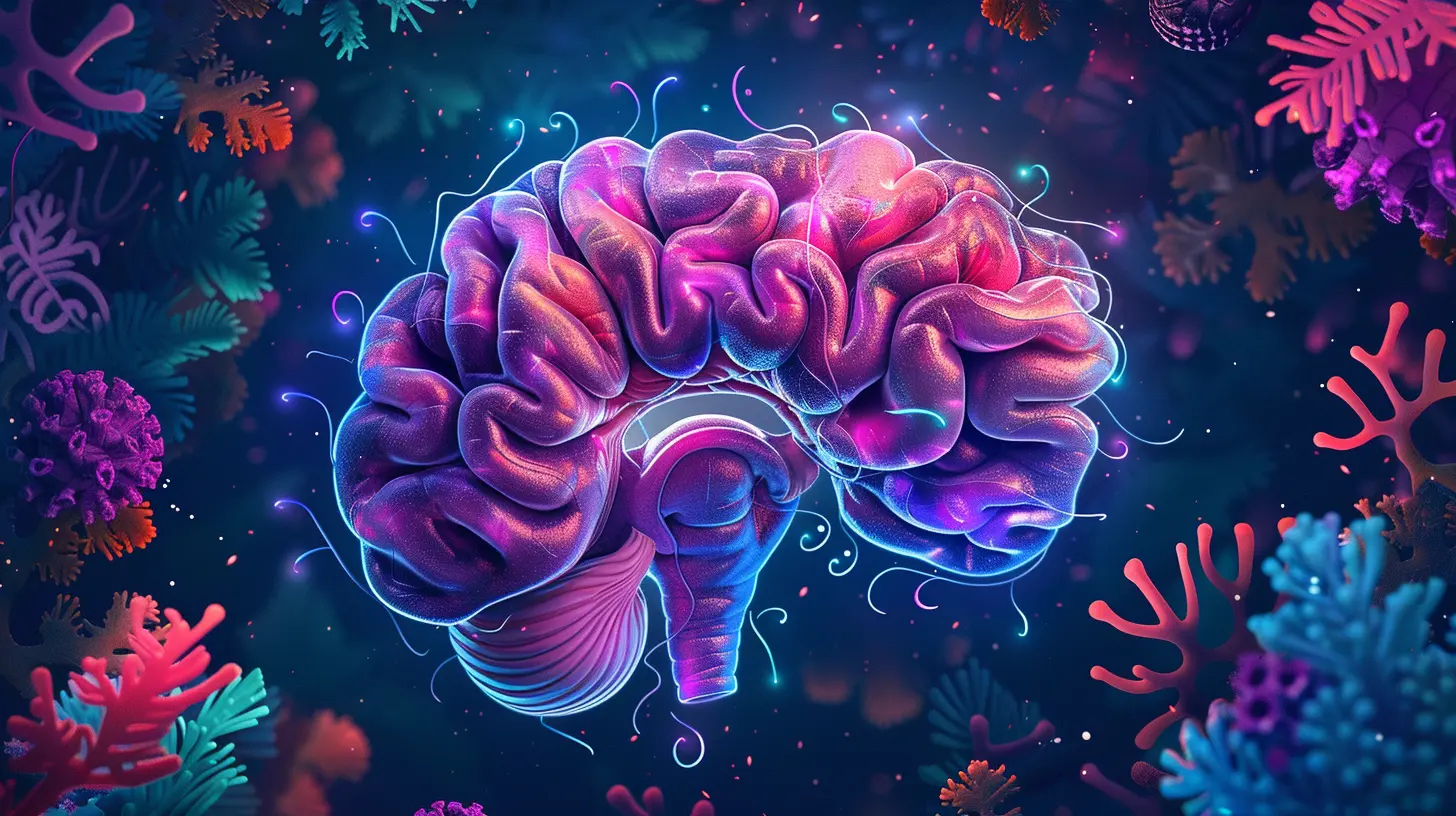The Gut-Hormone Connection: Why Your Digestive System Runs the Show
5 October 2025
Let’s talk about something you probably don’t think about daily—but maybe you should: your gut. You might imagine your digestive system as a simple food-processing machine, but it's actually more like a command center. If your body were a bustling city, your gut would be city hall, sending out messages and controlling a shocking number of systems—from your mood to your metabolism, even your sleep. Incredible, right?
You’ve likely heard about hormones and how they influence everything from stress levels to skin breakouts, but did you know your gut is one of the major conductors in that hormonal orchestra? Yep, your belly isn't just digesting tacos—it’s influencing some serious bodily business.
Let’s dive in and unpack this amazing "gut-hormone" connection. I promise, by the end of this, you’ll look at your digestive system with a whole new respect.
What Exactly Is The Gut-Hormone Connection?
First, let’s clear something up. When we say the “gut,” we’re not just talking about your stomach. We're referring to the entire digestive tract, including the stomach, small intestine, large intestine, and gut microbiome (all those tiny bacteria living inside you). This system does way more than break down food.Now, enter hormones—your body’s chemical messengers. They travel through your bloodstream, telling your organs and tissues what to do and when to do it. Think of them like text messages your body sends to keep everything running smoothly.
So, how are they connected? Well, your gut actually produces and regulates many of these hormones. That’s right—your gut isn't just involved in digestion; it’s crucial in hormonal communication.
Your Gut is a Hormone-Producing Powerhouse
Surprise! Your digestive system is one of the biggest hormone-producing organs in your entire body. Ever heard of serotonin? It’s often called the “feel-good” hormone because it helps regulate mood. Guess what? About 90% of your body’s serotonin is made in your gut, not your brain.But that’s just the beginning. Your gut also plays a role in the production of:
- Ghrelin: The “hunger hormone” that tells you when it’s time to eat.
- Leptin: The one that signals when you’re full.
- Insulin: Regulates your blood sugar.
- Cortisol: Your stress hormone (yep, that one too).
- GLP-1, PYY, and CCK: Hormones that regulate appetite, digestion, and energy balance.
The gut isn’t just involved—it’s in charge of the hormonal guest list.
The Gut-Brain Axis: Your Second Brain at Work
Hang onto your hat, because this part’s wild. Your gut actually has its own nervous system, often referred to as the “second brain.” It’s called the enteric nervous system, and it contains more than 100 million nerve cells. That’s more than your spinal cord!These nerves allow the gut and brain to speak directly to each other through something called the gut-brain axis. This two-way communication system helps regulate mood, digestion, stress response, and more.
Ever felt “butterflies in your stomach” when nervous? Or lost your appetite under stress? That’s the gut-brain axis in action.
Microbiome Mayhem: How Gut Bacteria Influence Hormones
Let’s talk bacteria—but the good kind. Your gut is home to trillions (yes, trillions!) of microbes collectively known as the gut microbiome. These tiny guys play a massive role in hormone production and regulation.When your gut bacteria are in balance, they help:
- Regulate estrogen levels.
- Moderate insulin sensitivity.
- Aid in thyroid hormone conversion.
- Support production of neurotransmitters like dopamine and GABA.
But when things go haywire—say, from stress, poor diet, or antibiotics—the balance can shift. This can lead to hormonal imbalances, mood swings, weight gain, and even issues like PCOS or thyroid dysfunction. So yeah, those little bugs matter... a lot!
The Hormonal Domino Effect
Let’s say your gut is inflamed or your microbiome is out of balance. This doesn't stay a local issue. It creates a domino effect throughout your body.Here’s how it might go:
1. Gut bacteria gets disturbed.
2. Estrogen doesn't break down properly.
3. Estrogen builds up.
4. You start experiencing symptoms like PMS, bloating, or acne.
Or how about this one:
1. Poor gut health leads to poor serotonin production.
2. Mood dips, you feel anxious or depressed.
3. Stress increases, cortisol rises.
4. Cortisol damages gut lining more, and round and round we go.
See the pattern? Your gut sets the pace, and your hormones dance to its rhythm.
Real-Life Symptoms That Point to the Gut-Hormone Connection
If your gut is calling the hormone shots, it might start sending distress signals when something's wrong. Here are a few signs your gut-hormone relationship might be off:- Persistent bloating or gas
- Mood swings or increased anxiety
- Constant fatigue
- Sugar cravings
- Irregular periods
- Unexplained weight gain or loss
- Poor sleep
- Breakouts and skin issues
Sound familiar? You’re not alone. Most people experience some combination of these symptoms at some point. The good news? You can start fixing things right now.
Simple Ways to Support Your Gut and Balance Hormones
Alright, so your gut is the MVP in this hormone game. Let’s protect that all-star player. Here’s how you can show your digestive system some love and keep your hormones humming:1. Eat More Fiber
Fiber feeds the good bacteria in your gut. Think beans, broccoli, berries—all the “B” foods!2. Go Fermented
Foods like kefir, kimchi, sauerkraut, and yogurt are packed with probiotics (good bacteria!).3. Cut the Sugar
Sugar fuels the bad bacteria and throws your hormones into chaos. Try to minimize processed treats.4. Manage Stress
Easier said than done, right? But even a few minutes of deep breathing, yoga, or a walk outside can cut cortisol levels dramatically.5. Sleep Like It’s Your Job
Your gut heals while you sleep. Less sleep = more hormone havoc. Aim for 7–9 hours a night.6. Stay Hydrated
Water helps flush out toxins, supports digestion, and keeps your system running smoothly.7. Limit Antibiotics and NSAIDs
These meds can disrupt your gut microbiome. Always use them wisely and support your gut flora afterward.8. Try a Probiotic Supplement
Sometimes food isn’t enough. A high-quality probiotic can help balance your gut bacteria and, by extension, your hormones.Specific Gut-Hormone Links Worth Noting
Let’s go even deeper. Want to geek out a bit? Here are a few hormone-specific connections to be aware of:Estrogen and the Estrobolome
The estrobolome is a collection of gut bacteria that help metabolize estrogen. When this group of microbes is out of whack, excess estrogen sticks around longer than it should. Think: heavy periods, mood swings, breast tenderness. Keeping your estrobolome healthy means estrogen stays balanced.Cortisol and the Leaky Gut
High cortisol (thanks, stress!) weakens your gut lining. This can lead to something called leaky gut syndrome, where toxins sneak into your bloodstream, triggering inflammation and—you guessed it—more hormonal imbalance.Insulin and Inflammation
Chronic gut inflammation messes with insulin sensitivity, raising your risk for conditions like prediabetes, PCOS, and metabolic syndrome. Balancing the gut helps keep blood sugar stable.Final Thoughts: Treat Your Gut Like Gold
Let’s face it—we often treat our digestive system like an afterthought. We eat on the go, skimp on sleep, scroll our way through stress, and expect our bodies to just… deal with it. But now you know better.Your gut isn’t just a passive digestor—it’s the control center for your hormones, your mood, your weight, and honestly, your overall health. When you take care of your gut, everything else starts to fall into place.
So next time you feel off—whether emotionally, physically, or hormonally—don’t just blame your period or the weather. Maybe, just maybe, your gut is trying to get your attention.
Give it what it needs. It’s running the show, after all.
all images in this post were generated using AI tools
Category:
Gut HealthAuthor:

Jackson Mahoney
Discussion
rate this article
1 comments
Kalani Strickland
Oh great, now my gut's running the show! Can’t wait for it to start making my life decisions too!
October 23, 2025 at 2:18 PM

Jackson Mahoney
Haha, it’s amazing how much influence our gut has! Understanding this connection can empower us to make healthier choices.


